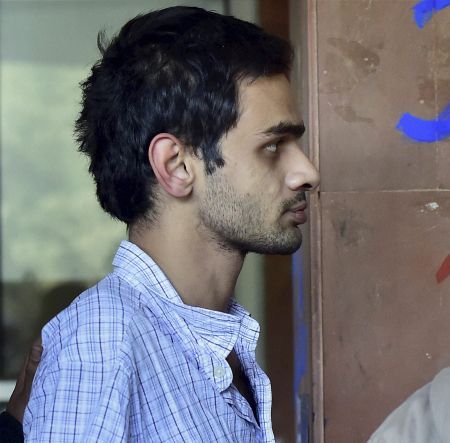 Jawaharlal Nehru University students Umar Khalid and Anirban Bhattacharya, facing sedition charge for allegedly raising anti-India slogans at the university campus last month, were on Friday granted interim bail for six months by a Delhi court on ground of parity with Kanhaiya Kumar.
Jawaharlal Nehru University students Umar Khalid and Anirban Bhattacharya, facing sedition charge for allegedly raising anti-India slogans at the university campus last month, were on Friday granted interim bail for six months by a Delhi court on ground of parity with Kanhaiya Kumar.
The court observed that the "role attributed" to JNUSU President Kanhaiya Kumar does not appear to be different from the allegations levelled against these two accused.
Additional Sessions Judge Reetesh Singh granted the relief to the duo on furnishing of a personal bond in the sum of Rs 25,000 with one surety of the like amount which was complied with by them and they were ordered to be released till September 19.
Sangeeta Das Gupta and Rajat Dutta, two teachers at JNU's Centre for Historical Studies, stood sureties for Anirban and Umar respectively.
While dealing with the bail applications, the court said "although the allegations levelled against Umar and Anirban are per se serious in nature but as claimed by the police themselves, the video footage of the incident has been sent to the forensic sciences laboratory. Its analysis and final report will certainly take time."
"When all the aforesaid circumstances are weighed together and keeping in view that no previous criminal record of any nature whatsoever has been alleged and the fact that nothing has been brought on record which could indicate that they are likely to abscond from the jurisdiction of the court, then besides the ground of parity vis-a-vis release of Kanhaiya Kumar on bail, I deem it appropriate to release both the accused on interim bail for a period of six months...," the judge said.
The court also directed Umar and Anirban not to leave Delhi without its permission during the period of interim bail and to make themselves available before the investigating officer as and when required for the purpose of the probe.
In its 12-page order, the court said, "At the outset, it is to be kept in mind that co-accused Kanhaiya Kumar has been granted bail by the High Court".
The court noted that keeping in view the allegations against the accused, the "question arises as to whether the present accused can claim any parity with co-accused Kanhaiya Kumar who has been granted bail."
Referring to the status report filed by Delhi Police before the high court while opposing Kanhaiya's bail plea, the judge said it was "apparent that the case set up by the police qua co-accused Kanhaiya Kumar was also of organising as well as participating in the said event".
"The allegations qua the present accused (Umar and Anirban) are similar to the allegations made with respect to Kanhaiya in the status report submitted before the high court during consideration of his bail application," the court said.
On the submission advanced by the police that there were statements of witnesses to the alleged incident, the court said, "having gone through the statements of Sourabh Kumar Sharma, Sandeep Kumar and Akhilesh Pathak, it does not appear that the role attributed to Kanhaiya Kumar in the statements of these witnesses is any different to the allegations made against the present accused/applicants."
It said that both Umar and Anirban are "highly educated persons" having graduated from premier colleges of Delhi University, completing their MA and MPhil from JNU and they are currently pursuing PhD from the university.
"They have been residing in JNU for the past 5-6 years. Their credentials and family backgrounds as stated in their bail applications have not been contested by the state. No submission has been made to the effect that both the applicants have been involved previously in any criminal case. No record has been placed by the state regarding any such past conduct of both these persons," it noted.
Discussing the severity of punishment in event of conviction under section 124A (sedition) of the IPC, under which both the accused have been arrested along with other provisions of the IPC, the court said it prescribes three kinds of punishment which may extend upto life term.
"It is clear that the law itself provides for a wide spectrum of nature and quantum of punishment which can be imposed upon an accused in case of conviction for the said offence. However, I do not wish to delve further in this regard at this stage of the matter," it said.











 © 2025
© 2025